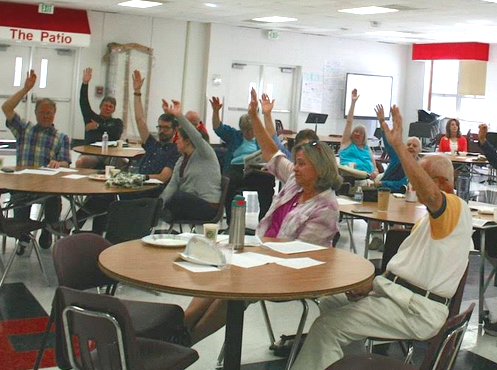Denver’s Largest Neighborhood Coalition Demands Vision Zero
Denver’s Inter-Neighborhood Cooperation, a group that represents about 100 neighborhoods throughout the city, just adopted a transportation platform [PDF] that petitions, among other things, for Vision Zero. The platform should send a message to Mayor Michael Hancock’s office: The city must acknowledge that traffic deaths and serious injuries are unacceptable and develop a Vision Zero strategy to prevent them.

Here’s some pretty strong language from INC’s position:
Denver should commit itself, at the highest levels, to the Vision Zero goals of eliminating traffic fatalities and serious injuries, learning from the emerging best practices in other cities. This is a moral issue — life and health are of paramount importance, and the transportation systems and features should lessen the impact when inevitable human errors occur.
This demand for safer streets comes from some of the city’s most civically engaged people.
“There’s kind of a tipping point that the city is really, really close to,” said INC Transportation Committee Co-chair Geneva Hooten. “With the amount of voices speaking up from around the city — WalkDenver, BikeDenver, INC, the mayor’s bike and pedestrian advisory committees, even internally in city departments — there are enough people talking about Vision Zero that it seems like it’s fated, like it’s going to happen.”
Less clear, however, is what form the city’s commitment to safe streets will take. Hancock’s budget includes line items labeled “Vision Zero” but he hasn’t publicly committed to ending traffic deaths and serious injuries. Instead the budget document waxes about “educating the community about how to travel safely” and “reducing” traffic violence, which is far from a concrete timetable to bring the number of traffic deaths down to zero.
Will Hancock commit to a multi-faceted, citywide program to systematically eliminate traffic deaths, or is he just slapping some branding on one-off projects?
“The benefit of Denver adopting Vision Zero is that it would be a comprehensive look at safety,” Hooten said. “It will require accountability from a lot of different departments, from police, public health, public works, planning, the mayor’s office, City Council. All these organizations will have to say, ‘We agree in this ethic that no one should die in transportation.'”
As INC’s platform states, Denver should learn from other cities. New York’s Vision Zero program encompasses several departments and a state legislative agenda — in year one it resulted in the fewest pedestrian deaths in the city’s recorded history. Seattle adopted the goal as a public health responsibility, and pays for street improvements with revenue from red light camera tickets — $15 to $20 million a year.
Hooten studied Seattle’s strategy and the strategies of other Vision Zero cities before INC adopted its platform. The X-factor? A mayor willing to be accountable for lives lost on city streets.
“From these cities we’ve learned that we need a strong mayoral leadership to say, ‘Yes, that’s what I want, I’m going to make funding for it, and I’m going to make the hard decisions to make this happen. I’m going to be vulnerable as a city,” Hooten said.
The INC platform is a sign of the growing public mandate for change. We’ll see if the Hancock administration is listening.


